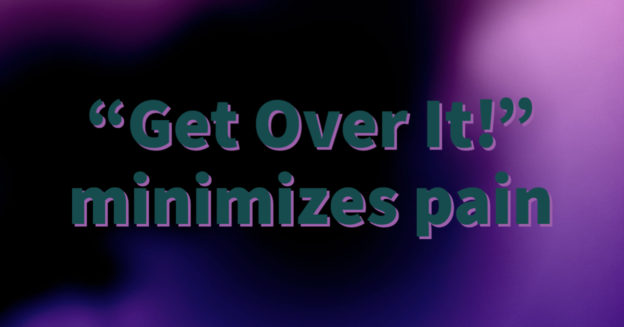What does it mean to get over it? In general, it means that we are no longer in the emotional grips of a past event. National Get Over It Day was created by Jeff Goldblatt in 2007 when he was having difficulty getting over a girlfriend. He realized his troubles were relatable to many people. Here’s a link to the National Get Over It website: https://nationaltoday.com/national-get-over-it-day/
Michael Friedmann’s July 1, 2021 blog on the Psychology Today site says, “…getting over it is no longer being in the emotional grips of a past event. We can remember the event, but we are not allowed to wallow in our past emotions.” Dr. Friedmann doesn’t believe that it is reasonable to simply get over it, and the people close to us who are telling us to do so don’t necessarily have our best interests at heart. They want us to get over it so they don’t have to deal with the emotional fallout resulting from our struggles.
In Friedmann’s opinion, being told by our loved ones to get over it can make things worse. The more we try to get over it, the more we suppress our emotions before we have really looked at them and determined what to do with them. We don’t want to or can’t deal with the problem now, so we avoid our pain and emotions instead of looking at it.
Most people cannot simply shut down their reactions to something traumatic from the past, nor would it be healthy to do so. Elizabeth Lombardo, PhD, who is a clinical psychologist and author of A Happy You says that often getting over something brings to mind the phrase forgive and forget. Getting over something is different. She states that “while there is the forgive aspect, it’s not about forgetting — it doesn’t mean that you condone what has happened or that it doesn’t hurt — it means that you are releasing the anger, sadness, and resentment that goes along with it.”
Dr. Sanam Hafeez, a New York psychologist, agrees. She says that the implication that you are over-acting or prolonging something that isn’t real is harmful. She believes there are two reasons people suggest that you get over it. They care about you and want to help, or they want to minimize their stress about what you are going through.
Here are her 6 tips to help process your issue:
- Create an affirmation that will counter your negative thoughts. Remember that good affirmations are short and easily remembered. Don’t recite a whole catalog of things. Be simple. Be brief. Say it often. Post it where you can see it. If you have trouble writing your own, use a common mantra like “om.”
- Stay away from places that remind you of your issue. Don’t go shopping right after work if you expect to run into her running the same errand. Find a new book club. Join a running group he isn’t a part of. If you aren’t constantly reminded, you will think of it less and be better able to process it.
- Focus on you. Don’t let things fester and grow. Process your hurt. If you feel drained when you get home, do something nice for yourself. Healthy self-care is important. Walk, meditate, exercise, read a book, make music, go for a run, etc. Dr. Hafeez believes a healthy dose of comfort (healthy comfort, of course) will empower you.
- Don’t undervalue the strength you can receive from those you love. Lean on them for support.
- Talk about what is bothering you. Although you don’t want to expose yourself to the issue or person you are trying to get over, you need to discuss it without feeling guilty. Dr. Hafeez suggests, “Find a friend or therapist who is patient, accepting, and willing to listen can go a long way.”
- Even if you haven’t received an apology from whoever hurt you, you can forgive yourself. Keep using healthy self-talk to move forward.
Downloaded from https://www.wellandgood.com/tips-for-getting-over-it/ Mar 8, 2022.
One thing almost everyone believes is important no matter where we are in the process of dealing with our issues, is the ability to relax. Guided imagery is a great way to get there. According to Julie Lusk, author of two volumes of 30 Scripts, Guided Imagery for Meditation and Inner Healing, Second Edition and an expert on guided imagery, yoga, and relaxation in general, people will imagine vivid scenes, colors, images, or sounds while others will focus on what they are feeling. Therefore, a selection of scripts or exercises is helpful.
Try this one on for size, both for you and your clients. Click on this link to Magic Carpet Ride, by Judy Fulop, and included in 30 Scripts, Volume 2. If working with clients, read it at a steady pace, following the directions within the script. If you are doing it by yourself, read a paragraph, and then do as it suggests. Some find it easier if they read out loud. Others prefer reading to themselves. Try it several times until you find what works best for you and your group. Relaxation is a muscle skill just like tossing a baseball or playing the piano. Give yourself and your clients a chance to master the technique.


